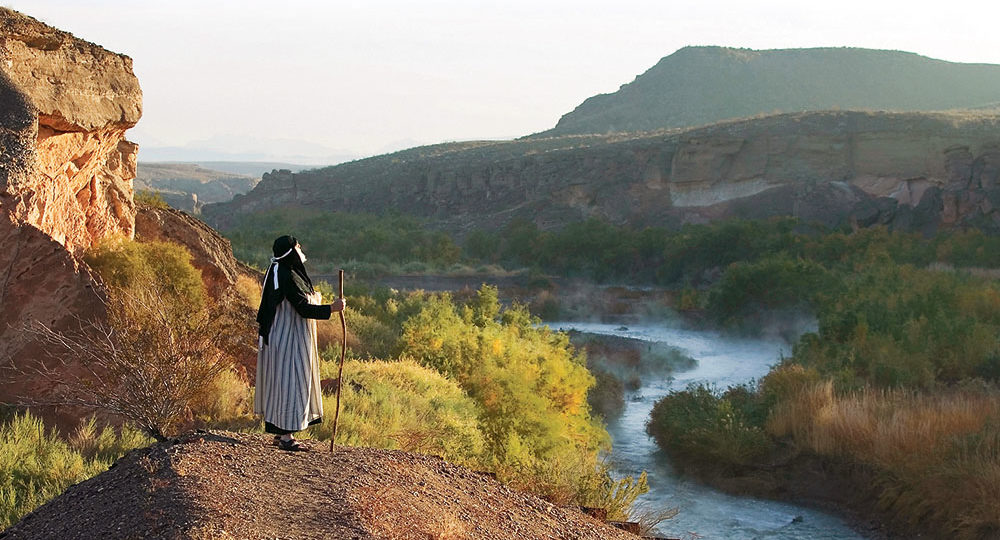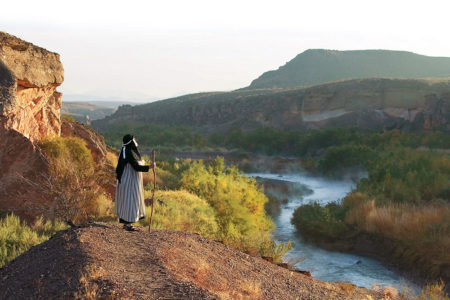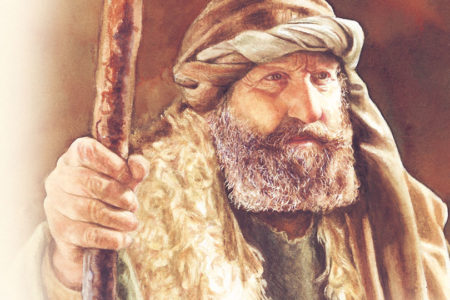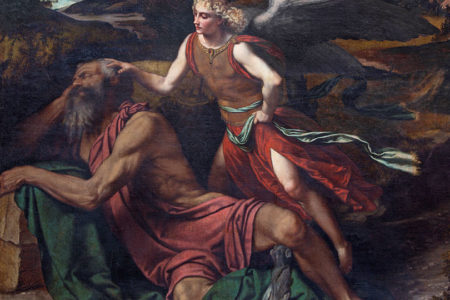By Faith Abraham: Hebrews 11:8–19
Hebrews 11 describes the faith of the three men the Jewish people hold to be the cornerstone of Judaism: Abraham, Moses, and David. Abraham is also called the “friend” of God (Isa. 41:8). We consider his life of faith, as recorded in Hebrews 11, from five perspectives.
Abraham Struggled with a Call
“By faith Abraham, when he was called to go out into a place which he should after receive for an inheritance, obeyed; and he went out, not knowing where he went” (v. 8).
This verse summarizes events in Abraham’s life that occurred over an extended period of time. An examination of the early portion of Abraham’s call reveals struggle, delay, and missed blessings.
God clearly told him in Genesis 12:1 to leave his country, kindred, and father’s house and go to a land that the Lord would show him. Eventually Abraham obeyed God, but apparently not without a great deal of struggle in his soul. He left his home in Ur of the Chaldeans but made a detour up to Haran. Several years elapsed before he went on to the land of Canaan. He probably left most of his family behind when he left Ur, but he did take along Terah, his father, and Lot, his nephew. Abraham did not move on until he was 75 years old and Terah had died.
After moving on to the promised land, he still did not separate himself completely from his family, for Lot went with him. Abraham did not fully experience God’s blessing until he made a complete separation, which occurred when, because of the shortage of pasture land, Lot chose to relocate in the area of Sodom.
Although Scripture does not specifically state it, Sarah may have also been a source of problems early in the journey, for her very name means contentious. In the ancient Hebrew culture, the meaning of a person’s name usually denoted some aspect of his or her character.
Nevertheless, the Bible points out that Abraham moved by faith. We can learn a lesson from this patriarch by being willing, as he was, to step out in faith when the Lord calls us. Struggling against His commands can cause delay in receiving His blessings.
Abraham Sojourned in a Strange Land/span>
“By faith he sojourned in the land of promise, as in a foreign country, dwelling in tents with Isaac and Jacob, the heirs with him of the same promise” (v. 9).
In all probability, living in a tent was not a new experience for Abraham. His background was Semitic, having been born into a nomadic society, although he had dwelt in Ur. When he obeyed the call of the Lord and went to the land of promise, he still moved around frequently. The Bible indicates that he spent time in Shechem, Hai, Bethel, Hebron, Gerar, and Beersheba. He even went down into Egypt for a time. Abraham lived in this strange country by faith, resting on the promises of God. He was told, “Unto thy seed will I give this land: and there builded he an altar unto the Lᴏʀᴅ, who appeared unto him” (Gen. 12:7). Possession of the land was still a matter of promise, for the Canaanites lived there at the time of his arrival. Later the Lord defined to Abraham the boundaries of the land (Gen. 15:18), and by faith he claimed God’s promises. There is no biblical record that he ever returned to Ur.
The tents in which Abraham lived were probably made of animal skins sewn together. He had neither a permanent home nor even a permanent plot of land on which to pitch his tent. He was always ready to move on at God’s command. By faith, Abraham recognized that he was merely a pilgrim and a stranger, and thus it was easy to change locations.
A great lesson shines forth from this aspect of Abraham’s life. As believers, we must be willing to walk by faith. We tend to want permanent possessions, but they can encumber us. Our desires are often based on permanency here on earth. We forget that life is short. Like Abraham, we must realize that we are merely pilgrims and strangers in this world. We cannot base our lives on our families, houses, or possessions. We must walk by faith, realizing that our eternal possession is far greater than anything we could ever have as we pass through our earthly lives. This world is not our home!
Abraham Set His Sights on a City
“For he looked for a city which hath foundations, whose builder and maker is God” (v. 10).
Although Abraham was but a sojourner—a pilgrim and a stranger—even in the land of promise, his faith led him much farther than a tent in that land. His hope went far beyond what he experienced in this life. His goal was a permanent, eternal home built by God.
The writer of Hebrews clearly stated that Abraham, as well as those mentioned earlier in chapter 11, saw the promises far off, were persuaded that they were true, and embraced them. Their faith was so strong that they endured the hardships of this life, looking beyond the temporal to the eternal. They were looking for a country, God’s country (vv. 13, 16), which is far better because it is a heavenly country. The Bible declares that God accepted their faith: “wherefore, God is not ashamed to be called their God; for he hath prepared for them a city” (v. 16). Abraham could have returned to Ur, but apparently the thought never crossed his mind. He and the others who lived by faith looked ahead to the home God was preparing for them (v. 15).
Paul put it another way when he said, “forgetting those things which are behind, and reaching forth unto those things which are before, I press toward the mark for the prize of the high calling of God in Christ Jesus” (Phil. 3:13–14). All that Paul had experienced in the past he counted as naught. The only thing that mattered was what he had in the Lord. So it was with Abraham.
Abraham Sought an Heir
“Through faith also Sarah herself received strength to conceive seed, and was delivered of a child when she was past age, because she judged him faithful who had promised” (v. 11).
In Genesis 12:7 God promised to give the land of Canaan to Abraham’s seed. After Lot was separated from him, God reiterated the promise. Furthermore, the Lord told Abraham that his seed would be as numerous as the dust of the earth (Gen. 13:16).
As time went on, Abraham and Sarah passed the normal age of childbearing. Abraham knew God’s promises, and, realizing that nothing had occurred, he asked the Lord if his servant Eliezer was the one through whom the promise would be fulfilled, because a servant born in the master’s household could become his heir (Gen. 15:2–3). The Lord responded that Eliezer would not be the heir. The heir would be Abraham’s natural born child. He further reminded Abraham that his seed would be as numberless as the stars of heaven (Gen. 15:4–5).
The record of this exchange between Abraham and the Lord is followed by the first direct reference to Abraham’s faith: “And he believed in the Lᴏʀᴅ; and he counted it to him for righteousness” (Gen. 15:6). Because of his faith, Abraham had the righteousness of God imputed to him. The Lord rewarded that faith with a blood covenant, stating that the land would be given to the portion of Abraham’s seed that would go into bondage in Egypt for 400 years and later return—that is, the Jewish people.
Many more years passed, and it seemed even more impossible that Abraham and Sarah would have a natural born child. Sarah then devised a plan of her own. She suggested that Abraham produce an heir through her handmaid Hagar, the Egyptian. Thus Hagar conceived. Then Sarah became violently jealous of her and began to despise her. Hagar fled into the wilderness, where the Lord met her, told her about the child she would soon bear, and sent her home, where Ishmael was eventually born.
Sarah tried to help God and convinced Abraham of the validity of her plan. But without seeking the Lord’s will, they made a tragic decision that has caused major problems since the day the idea first occurred to Sarah.
After all of His promises to Abraham, God again reminded him! “I will bless her [Sarah], and give thee a son also of her” (Gen. 17:16). Abraham laughed at the thought, and Sarah also laughed within herself upon hearing of God’s promise. But nothing is too hard for the Lord. About a year later Isaac, the promised heir, was born.
Abraham Was Willing to Surrender His Son as a Sacrifice
The patriarch’s patience had grown thin many times during the long years of waiting for the promised seed, and his faith had been greatly tested. When the child Isaac finally arrived, delight must have filled Abraham’s soul. But his faith was soon to be tested again—this time to a far greater extent than ever before.
The Lord told Abraham, “Take now thy son, thine only son Isaac, whom thou lovest, and get thee into the land of Moriah; and offer him there for a burnt offering upon one of the mountains which I will tell thee of” (Gen. 22:2). Abraham must have thought, “No Lord, not this!” But God had proven Himself to the patriarch so many times before that, with strong faith, he prepared to sacrifice his son, taking him to the very precipice of death before the Lord intervened and provided a ram as a substitutionary sacrifice. This father was willing to surrender his son as a sacrifice, “Accounting that God was able to raise him up, even from the dead, from which also he received him in a figure” (v. 19). Abraham passed the most difficult test of his faith with flying colors, and God again proved Himself faithful.
Conclusion
Nearly 4,000 years ago, without the benefit of the Scriptures, which we have today, Abraham learned to walk with God. Considering all the information about Him available to us, and in light of the multitudes of times the Lord has proven Himself faithful over the intervening four millennia, we too should be willing to walk by faith—daily and in every area of our lives.








